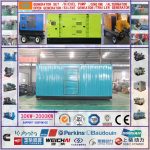Altitude testing plays a crucial role in ensuring the reliability and performance of various equipment and machinery that operate in high-altitude environments. Testing under simulated high-altitude conditions is essential to identify potential issues and make necessary adjustments to ensure the safety and functionality of these systems. One key component that is indispensable for altitude testing is the diesel generator. In 1000kw diesel generator for remote communication towers , we will explore the importance of diesel generators for altitude testing, their key features, and the considerations to keep in mind when selecting a diesel generator for this purpose.
Importance of Altitude Testing
Altitude testing involves subjecting equipment to reduced air pressure and oxygen levels similar to those experienced at high altitudes. This type of testing is crucial for a wide range of industries, including aerospace, automotive, defense, and telecommunications, among others. High-altitude conditions can significantly affect the performance and efficiency of various systems, including engines, generators, and electronic components. By conducting altitude testing, manufacturers can ensure that their products are capable of operating reliably in high-altitude environments and meet the necessary safety and performance standards.
One of the primary reasons for conducting altitude testing is to assess the performance of combustion engines, such as aircraft engines, automotive engines, and power generators, under reduced air pressure conditions. At higher altitudes, the air becomes less dense, leading to lower oxygen levels, which can affect the combustion process in engines. Altitude testing helps manufacturers determine how their engines will perform in high-altitude environments and allows them to make necessary adjustments to optimize performance and fuel efficiency.
Another important aspect of altitude testing is the evaluation of electronic components and systems that may be affected by the low air pressure conditions at high altitudes. Electronic devices, sensors, and communication systems must be tested to ensure that they can function properly in such environments. Altitude testing helps identify any potential issues with electronic components and allows manufacturers to make design modifications to improve the reliability and performance of these systems.
Key Features of Diesel Generators for Altitude Testing
Diesel generators are widely used in altitude testing due to their reliability, durability, and efficiency. These generators are capable of providing a reliable source of power under varying load conditions, making them well-suited for simulating high-altitude testing environments. Here are some key features of diesel generators that make them ideal for altitude testing:
1. Robust Construction: Diesel generators are known for their robust construction and durability, making them suitable for operating in harsh testing environments. The rugged design of diesel generators allows them to withstand high-altitude conditions, extreme temperatures, and varying load demands.
2. Fuel Efficiency: Diesel generators are highly fuel-efficient, making them cost-effective for prolonged testing periods. The fuel consumption of diesel generators is relatively low compared to other types of generators, making them an ideal choice for continuous operation during altitude testing.
3. Reliable Performance: Diesel generators are known for their reliable performance and low maintenance requirements. These generators can provide a stable source of power even under challenging conditions, making them essential for conducting accurate altitude testing.
4. High Power Output: Diesel generators are capable of providing high power output, making them suitable for powering a wide range of equipment and machinery during altitude testing. The high power output of diesel generators ensures that all testing procedures can be carried out effectively and efficiently.
Considerations for Selecting a Diesel Generator for Altitude Testing

When selecting a diesel generator for altitude testing, several key considerations should be taken into account to ensure optimal performance and reliability. Here are some important factors to consider when choosing a diesel generator for altitude testing:
1. Altitude Rating: It is essential to select a diesel generator with an altitude rating that matches the altitude at which the testing will be conducted. Diesel generators with higher altitude ratings are designed to operate efficiently at higher elevations and maintain their performance under reduced air pressure conditions.
2. Power Output: The power output of the diesel generator should be sufficient to meet the requirements of the testing procedures and power all the equipment and machinery involved in altitude testing. It is crucial to calculate the total power demand of the testing setup to determine the appropriate power rating for the diesel generator.
3. Fuel Efficiency: Opt for a diesel generator that offers high fuel efficiency to minimize operating costs during altitude testing. Fuel consumption can significantly impact the overall cost of conducting altitude testing, so selecting a fuel-efficient generator can help reduce expenses.
4. Emissions Compliance: Ensure that the diesel generator complies with emissions regulations and standards to minimize environmental impact during altitude testing. Select a generator that meets the relevant emissions requirements to ensure compliance with environmental regulations.
5. Maintenance Requirements: Consider the maintenance requirements of the diesel generator and choose a model that is easy to maintain and service. Regular maintenance is essential to ensure the reliable performance of the generator during altitude testing and extend its service life.
6. Noise Level: Pay attention to the noise level of the diesel generator, especially if the testing facility has noise restrictions or if noise levels can affect the accuracy of the testing procedures. Select a generator with low noise emissions to minimize disturbances during altitude testing.
In conclusion, diesel generators play a crucial role in altitude testing by providing a reliable and efficient source of power for simulating high-altitude conditions. These generators offer robust construction, fuel efficiency, reliable performance, and high power output, making them ideal for conducting accurate and effective altitude testing across various industries. When selecting a diesel generator for altitude testing, consider factors such as altitude rating, power output, fuel efficiency, emissions compliance, maintenance requirements, and noise level to ensure optimal performance and reliability. By choosing the right diesel generator for altitude testing, manufacturers can conduct thorough testing procedures to ensure the safety and performance of their products in high-altitude environments.
